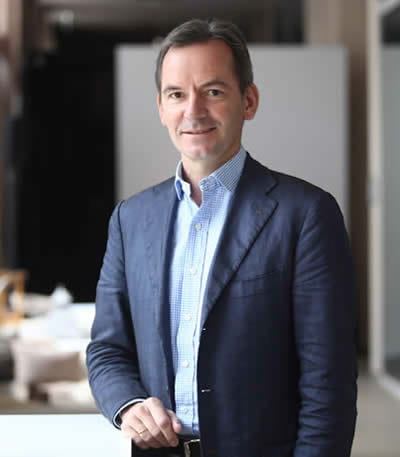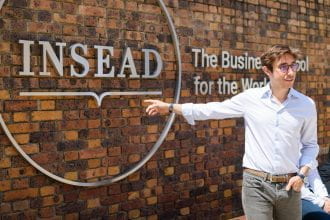 New INSEAD Chairman of the Board explores risk, reward and the school’s future
New INSEAD Chairman of the Board explores risk, reward and the school’s future
It’s 2 a.m. and Ivory Coast cocoa farmers are keeping global entrepreneur Andreas Jacobs MBA’90D awake back home in Germany.
Those farmers produce a third of the world’s cocoa and are an integral part of his family’s majority stake in Barry Callebaut, the world’s largest chocolate producer. The business is thriving, with more than 9,000 employees operating across some 30 countries, but Andreas, 51, understands risk too well to let today’s success blind him to the enduring strategic challenges confronting the 150-year-old enterprise where he is Chairman of the Board.
“I’m a risk taker,” he says. “I like to shape organisations, and that means preparing them to take risks from the top of the organisation to the bottom.” Big risks in the chocolate business include those associated with land scarcity.
Andreas knows that those farmers and their plantations—about 800,000 in Cote d’Ivoire alone—are a precious resource that requires sustainable investment. Cocoa trees grow primarily near the Equator, limiting cultivation options. If farmers cannot earn enough from cacao, they may convert their land to reap a richer harvest from, say, rubber or oil.
“We work very closely with West African farmers to help them increase yield and, therefore, profitability for their families,” says Andreas, a father of four who has worked in the family business for the past 15 years. In addition, for the past 11 years, he has been Chairman and Director of Jacobs Holding, his family’s investment firm. In January, he became Chairman of INSEAD’s Board of Directors. He says that Barry Callebaut strives for the best sustainability standards in the industry. Under his leadership, the company also supports healthcare and literacy programmes for its farmers.
“The only way to provide enough cocoa for the world, long term, is to improve the livelihoods of these farmers,” says Andreas, noting that consumers today also demand more sustainable and fair sourcing. He acknowledges that the project is “massive” and requires coordination among various partners—business, governments and NGOs like the World Cocoa Foundation, whose membership represents 80 percent of the global cocoa market. “You need this ‘umbrella’ to coordinate and help on the ground in West Africa,” he explains. “Otherwise, we western companies wouldn’t have the capabilities to operate there.”
This collaborative sensibility is something Andreas says he learned from his father, Klaus Johann Jacobs. The eminent businessman and philanthropist built a coffee and chocolate empire and then directed much of his wealth to advancing youth education through the Jacobs Foundation, established in 1988 and overseen by the family since Mr. Jacobs’ death in 2008.
“I really learned from my father how to engage people, especially in business where you need a team and have to motivate that team,” says Andreas, who earned a law degree at the University of Freiburg before enrolling at INSEAD. He admits that his own native strengths favoured analysis. Those skills served him well as a consultant at BCG in the early 1990s after obtaining his MBA. “At the consulting firm, you are focused so much on logic. My father helped me learn how to establish a culture of passion and loyalty within an organisation. He also had a great talent for mergers and acquisitions, which he also shared.”
Academically, Andreas credits INSEAD with transforming his life. After studying at public university in Germany, he came to Fontainebleau and discovered a community with “exceptional talent and desire” to make a difference in the world. If earlier he had not fully understood the direction he wished to take his career, his INSEAD experience brought his potential into focus.
“The intellectual life at INSEAD was a huge change for me,” says Andreas. “I met very smart people from all over the world, not just Europe, and this really sharpened my mind.” He also says that INSEAD’s one-year programme was attractive both for its intensity and value: “At that time, my parents kept me on a very tight budget, so costs were important,” he recalls wryly.
When reflecting on INSEAD’s competitive advantages, Andreas says the school’s authentic global diversity is unique and powerful. “This experience of coming together in an amphi with all these ‘global citizens’ was impressive during my time as a student,” he recalls. “Now, it is even more impressive, because of how the school has developed its global footprint.”
Today, as INSEAD board chairman, Andreas is helping the school go from strength to strength. The heart of that strength is the institution’s entrepreneurial spirit, which was there from the start, he says. That spirit manifests itself in exceptional projects such as the Asia Campus expansion and its Leadership Development Centre, a S$55 million project that recently opened its doors after a successful fundraising campaign. Fundraising will remain among the school’s priorities, says Andreas, citing ongoing critical objectives. These include continuing to recruit and retain top faculty talent; make infrastructure investments, particularly on the Fontainebleau campus; and establish more scholarships to ensure that INSEAD can attract the best students regardless of financial considerations.
“It’s enormously important for INSEAD to attract diverse students,” says Andreas, who accepted the board chairman role because he wanted to contribute in a special way to a cherished institution. In addition to the financial professionals and consultants who have always found value in the school’s global curriculum, Andreas believes that a greater emphasis on technological innovation can attract even more tech-savvy scholars whose presence will further enrich INSEAD’s culture. The school also is a haven for entrepreneurs like himself, Andreas says, recalling a curriculum brimming with courses focused on new venture formation.
He says INSEAD is already taking important steps to ensure that it deepens its competitive advantage. This progress includes rolling out its new online learning programme, designed to deliver custom executive education solutions for clients. “Executive education is in constant change because of new market challenges,” Andreas says. “Online learning is a game-changer for larger firms especially, since it allows you to reach deeper into the organisation and across the enterprise. INSEAD is using digital tools to address companies in a much broader change-management approach.”
This subject of talent development is so vital that it unites Andreas’ professional and personal lives. As a businessman, he says that an enduring challenge is to attract top-quality people to an organisation. As a father, he says that “nurturing my children and helping them thrive” is his deepest, most heartfelt project.
It hasn’t been his most challenging one, though.
“Perhaps my most difficult project,” says Andreas, pausing reflectively and then laughing, “was attracting my wife to marry me.”


